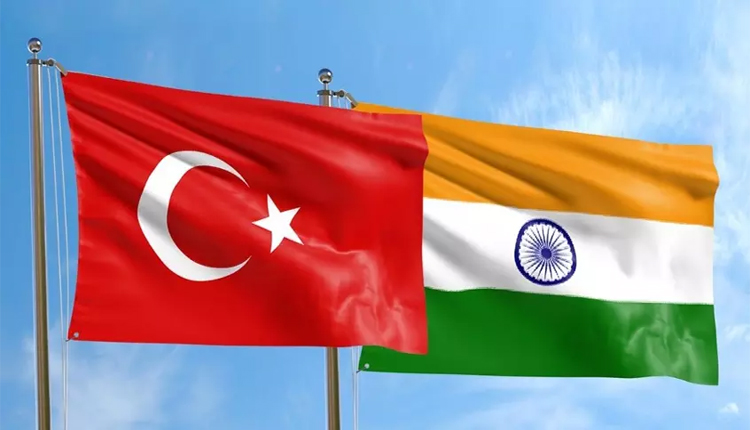New Delhi: After a recent round of military escalation, Turkey and Azerbaijan announced their support for Pakistan, and a wave of nationalist sentiment is sweeping across India, leading to a popularity boycott of Ankara and Baku. The adverse reaction, prompted by the Indian Response Operation Sindoor, a surgical attack on terror camps situated in Pakistan and Pakistan-occupied Kashmir, has seen numerous travel plans cancelled, imports from Turkey suspended, and a rising demand to break economic relations with both states.
This issue was triggered on 7 May, when on that day India launched Operation Sindoor following a deadly terror attack in Pahalgam, Jammu and Kashmir, on 26 civilians. Both Turkey and Azerbaijan were openly condemning the operation at the time, and Turkey provided Songar drones to Pakistan to use in the unsuccessful efforts to strike Indian military targets. Widening the rift, Azerbaijan’s foreign ministry announced “total solidarity” with Pakistan. Against this backdrop of cross-border terrorism emanating from Pakistan, this perception was accentuated further as a more profound betrayal, a high point for the Indians, since the latter had rendered humanitarian assistance to Turkey during its 2023 earthquake under Operation Dost.
The effect on travel agencies was similarly brutal. A week later, MakeMyTrip – India’s top online travel platform with the most stake in this market–reported a 60% dip in bookings to Turkey and Azerbaijan and a staggering 250% surge in cancellations. EaseMyTrip cited cancellations at 22% for Turkey and 30% for Azerbaijan. At the same time, travel agencies like Cox & Kings and the travel booking platform Ixigo have put a hold on any new bookings for both countries. According to Nishant Pitti, co-founder of EaseMyTrip, also one of India’s leading travel portals, “Travellers are voting with their feet. These choices are driven by “national pride”. Now, some operators are pushing Greece and Armenia as alternative destinations, claiming these destinations have better relations with India.
The tourism boycott is only part of the story. Traders in Udaipur, the capital of the marble hub in India, have pledged to refrain from purchasing marble from Turkey, which possesses 70% of marble exports to India, which amounts to around $350 million per year. Kapil Surana, president of the Udaipur Marble Processors Association, told reporters, “Business cannot supersede the pride of the country. Turkish apples worth $150 million in seasonal revenue have been removed from Pune markets by apple traders who have decided to go for Himachal Pradesh, Iran, and New Zealand produce instead. Javier, I remember USA patriotism— retail consumers are clear about rejecting Turkish products, said Pune APMC market trader Suyog Zende.
The movement has also gained momentum on social media, with hashtags like #BoycottTurkey and #BoycottAzerbaijan doing the rounds on platforms. Artwork by Sayali Amonkar Several prominent personalities, including actress Rupali Ganguly and business tycoon Harsh Goenka, have appealed to Indians to avoid travelling to the two countries. Tourism to Turkey has been called “blood money” by politicians, including Shiv Sena MP Priyanka Chaturvedi, who also demanded an end to airline partnerships with Turkish carriers. Meanwhile, IndiGo, which has a codeshare with Turkish Airlines, is pressured to rethink its pact.
We could be looking at a significant economic impact. Last year, Turkey hosted 330,000 Indian tourists, raking in almost $400 million. In comparison, Azerbaijan attracted 240,000 tourists due to its low-cost European atmosphere. The cancellations are expected to last six to nine months. Still, some experts believe it will damage the industry even more than in 2024 when the Maldives was boycotted for $2 billion to the island state due to diplomatic tensions. Government sources said Turkey’s overall Business with India, which includes lakh tonnes of apples worth $10 million and mineral oil worth $24.6 million and $1.8 billion, may also come under the scanner in the coming days.
Turkey’s tourism board says that Indian tourists are still welcome and the war does not impact them, but the reaction has been lukewarm. One doesn’t want to finance a country that is equipping our enemies,’ predicted Subhash Goyal, chairman of the Indian Chamber of Commerce’s Tourism Committee, estimating a 50-60 per cent fall in tourism to both countries. Some Indian companies, such as Goa Villas, supported the boycott by refusing to conduct Business with Turkish citizens.
The boycott marked a bigger change in the public’s mood; national loyalty started to change the fabric of the economy and culture as India rerouted its travellers and commerce. Turkey and Azerbaijan may soon find themselves paying a high price for aligning with Pakistan.



Comments are closed.